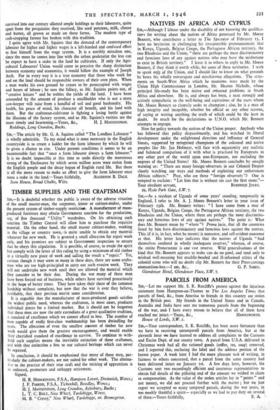TIMBER SUPPLIES AND THE CRAFTSMAN
Si,—It is doubtful whether the public is aware of the adverse situation of the small master-man, the carpenter, joiner or cabinet-maker, under the present system of timber-supply restriction. A manufacturer of mass- produced furniture may obtain Government sanction for the production, say, of five thousand "Utility" wardrobes. On his obtaining such sanction the Timber Control will allow him to purchase the requisite material. On the other hand, the small master cabinet-maker, working in the village or country town,-is quite unable to obtain any material whatever for new work. He is granted a small allocation for repair work only, and his premises are subject to Govertunent inspection to ensure that he obeys this stipulation. It is possible, of course, to evade the spirit but comply with the letter of this ruling by using a minimum of old timber in a virtually new piece of work and calling the result a "repair." Yet, curious though it may seem to many in these days, there are some crafts- men who are too high-principled to carry out such evasive work. They will not undertake new work until they are allowed the material which they consider to be their due. During the war many of these men have been forced out of business, while others have survived precariously in the hope of better times. They have taken their share of the common hardship without complaint, but now that the war is over they believe, justifiably, that their position merits some consideration.
It is arguable that the manufacturer of mass-produced goods satisfies the widest public need, whereas the craftsman, in most cases, produces individual pieces for a limited market. But it s-hould not be forgotten that these men are now the only custodians of a great qualitative tradition, a standard of excellence which we cannot afford to lose. The number of men capable of really first-class workmanship has been dwindling for years. The allocation of even the smallest amount of timber for new work would give them the greatest encouragement, and would enable their cherished standard of excellence to survive. To continue to with- hold such supplies means the inevitable extinction of these craftsmen, and with that extinction a loss to our cultural heritage which can never be repaired.
In conclusion, it should be emphasised that many of these men, par- ticularly the cabinet-makers, are not suited for other work. The alterna- tive to the practice of their true craft and the training of apprentices is an enforced, premature and unhappy retirement.
Signed,
H. R. HODGKINSON, F.S.A., Hampton Lovett, Droitwich, Worcs.; J. F. PARKER, F.S.A., Tickenhill, Bewdley, Worcs.; H. J. MASSINGHAM, Long Crendon, Aylesbury, Bucks ; L. T. C. ROLT, New Wharf, Tardebigge, Worcs.
M. B. "Cressy," New Wharf, Tardebigge, nr. Bromsgrove.


























 Previous page
Previous page